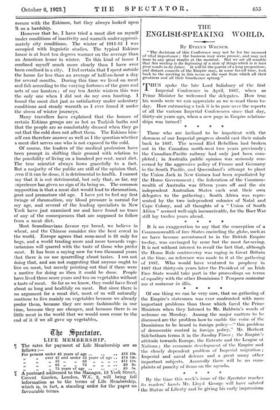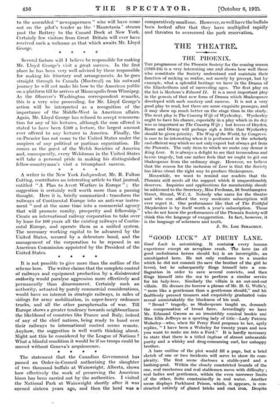THE
ENGLISH-SPEAKING WORLD.
By EVELYN WRENCH.
"The decisions of this Conference may not be for the moment of vital importance ; the business may seem prosaic, and may not issue in any great results at the moment. But we are all sensible that this alerting is the beginning of a state of things which is to have great results in the future. It will be the parent of a long progeniture, and distant councils of the Empire may, in some far-off time, look back to the meeting in this room as the root from which all their greatness and all their beneficence sprang."
THUS spoke the late Lord Salisbury of the first Imperial Conference in April, 1887, when as Prime Minister he welcomed the delegates. How true his words were we can appreciate as we re-read them to- day. How entrancing a task it is to pore over the reports of all the various Imperial Conferences since that day, thirty-six years ago, when a new page in Empire relation- ships was turned !
* * * * Those who are inclined to be impatient with the slowness of our Imperial progress should cast their minds back to 1887. The second Rid Rebellion had broken out in the Canadian north-west two years previously ; the Canadian-Pacific railway had only just been com- pleted ; in Australia public opinion was seriously con- cerned by the aggressive policy of France and Germany in the South Pacific, and Queensland's attempt to plant the Union Jack in New Guinea had been repudiated by the Home Government ; the federation of the Common- wealth of Australia was fifteen years off and the six independent Australian States each sent their own delegates to the gathering ; South Africa was repre- sented by the two independent colonies of Natal and Cape Colony, and all thoughts of a " Union of South Africa " seemed well-nigh inconceivable, for the Boer War still lay twelve years ahead.
It is no exaggeration to say that the conception of a Commonwealth of free States encircling the globe, such as we have become accustomed to in the British Empire to-day, was envisaged by none but the most far-seeing. It is not without interest to recall the fact that, although the Home Rule controversy was raging in Great Britain at the time, no reference was made to it at the gathering of 1887. Who would have ventured to prophesy in 1887 that thirty-six years later the President of an Irish Free State would take part in the proceedings on terms of equality with the other Dominions ? Tempora mutantur nos ct mutamur in illis.
* * * Of one thing we can be very sure, that no gathering of the Empire's statesmen was ever confronted with more important problems than those which faced the Prime Ministers when they listened to Mr. Baldwin's words of welcome on Monday. Among the major matters to be discussed are the problem how to enable the voice of the Dominions to be heard in foreign policy—" this problem of democratic control in foreign policy," Mr. Herbert Sidebotham terms it in the Sunday Times ; the Empire's attitude towards Europe, the Entente and the League of Nations ; the economic development of the Empire and the closely dependent problem of Imperial migration ; Imperial and naval defence and a great many other important subjects. Assuredly there will be no com- plaints of paucity of items on the agenda.
* * * * By the time this week's issue of the Spectator reaches its readers' hands Mr. Lloyd George will have saluted the Statue of Liberty and be giving his early impressions to the assembled " newspapermen " who will have come out on the pilot's tender as the ' Mauretania ' steams past the Battery to the Cunard Dock at New York. Certainly few visitors from Great Britain will ever have received such a welcome as that which awaits Mr. Lloyd George.
Several factors will I believe be responsible for making Mr. Lloyd George's visit a great success. In the first place he has been very well advised by those responsible for making his itinerary and arrangements. As he goes straight through to Canada (Montreal) on his outward • journey he will not make his bow to the American public on a platform till he arrives at Minneapolis from Winnipeg. As the Observer's Washington correspondent remarks, this is a very wise proceeding, for Mr. Lloyd George's action will be interpreted as a recognition of the importance of the Middle-West in American affairs. Again, Mr. Lloyd George has refused to accept remunera- tion for any of his lectures, although the sum offered is stated to have been £400 a lecture, the largest amount ever offered to any lecturer in America. Finally, the ex-Premier has not come to the United States under the auspices of any political or partisan organization. He comes as the guest of the Welsh Societies of America and, consequently, every Welshman in the United States will take a personal pride in making his distinguished fellow-countryman's visit a triumphant success.
* * * * A writer in the New York Independent, Mr. R. Fulton Cutting, contributes an interesting article to that journal, entitled " A Plan to Avert Warfare in Europe " ; the suggestion is certainly well worth more than a passing thought. Here it is, briefly summarized : transform the railways of Continental Europe into an anti-war instru- ment " and at the same time into a commercial agency that will promote comity, prosperity and fellowship." Create an international railway corporation to take over by lease for 100 years all the existing railways of Contin- ental Europe, and operate them as a unified system. The necessary working capital to be advanced by the United States, secured by a debenture bond, and the management of the corporation to be reposed in an American Commission appointed by the President of the United States.
* * * * It is not possible to give more than the outline of the scheme here. The writer claims that the complete control of railways and equipment production by a disinterested authority would paralyse aggression more effectively and permanently than disarmament.. Certainly such an authority, actuated by purely commercial considerations, would have no interest in strategic railways, in miles of sidings for army mobilization, in super-heavy ordnance trucks, and all the other paraphernalia of war. Till Europe shows a greater tendency towards neighbourliness the likelihood of countries like France and Italy, indeed of any of the chief nations, being ready to hand over their railways to international control seems remote. Anyhow, the suggestion is well worth thinking about. Might not this be considered by the League of Nations ? What a blissful condition it would be if no troops could be moved without Geneva's acquiescence.
* * * * The statement that the Canadian Government has passed an Order-in-Council authorizing the slaughter of two thousand. buffalo at Wainwright, Alberta, shows how effectively the work of preserving the American bison has been carried out by the authorities. I visited the National Park at Wainwright shortly after it was opened sixteen years ago, and then the herd was a comparatively small one. However, so well have the buffalo been looked after that they have multiplied rapidly and threaten to overcrowd the park reservation.











































 Previous page
Previous page